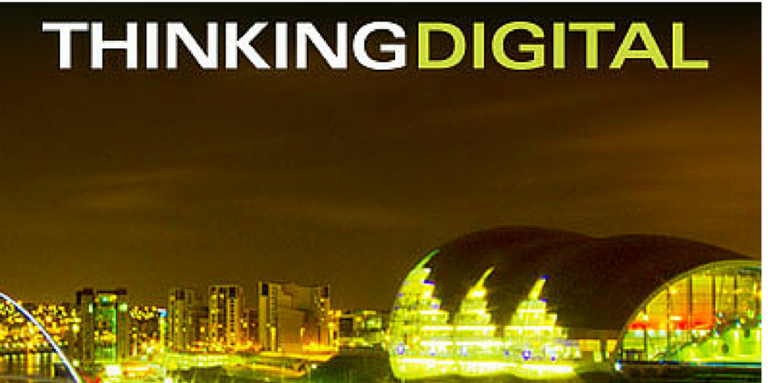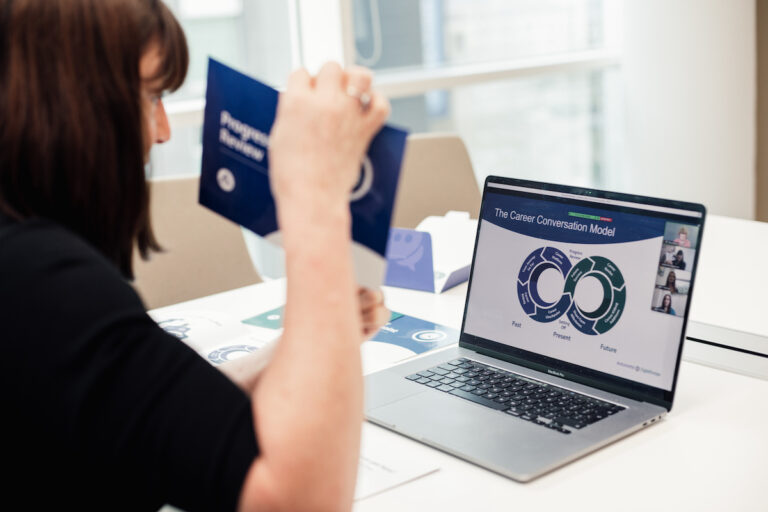I spent yesterday at the iconic Sage Centre in Gateshead attending a conference called Thinking Digital.
What is Thinking Digital?
Thinking Digital is for those who are curious about how technology is shaping our future. It is the brainchild of Herb Kim who launched the first Thinking Digital conference in 2008. This was the 4th annual event and the second time I’ve had the pleasure of attending.
Why was I there?
On this occasion I had the honour of being invited by one of the sponsors, Sage UK Ltd (the business software company rather than the conference setting – confusing I know!) I am part of the Sage Business Expert community and they asked me to come along and share my thoughts on what I learned and lessons for leaders in business.
My experience
What a fabulous and inspiring day. I am no tecchie but even a live coding session had me riveted. The overriding atmosphere was one of energy and inspiration. When I worked for Avanade, one of our company values was “Passion for Technology” and that was what I saw, heard and felt – from the speakers, from the audience and from the organisers. As someone who works with individuals to help them be more successful and fulfilled in their work, it was heart-warming to see people who love their work so much.
Lessons for Leaders
So, since I’m not a tecchie, what did I learn? And how do those lessons apply to leadership in business?
Lesson 1 – the need to retain and develop your talent has never been greater
Our first speaker, Luciano Floridi, kicked us off with a philosophical session on the impact of Artificial Intelligence (AI) I on human life. His key message? “Humans are replaceable, predictable, influential, and dependent. AI is coming, but we’re probably not totally screwed.” However, all these advances in technology mean jobs will change and the new jobs will need more skills, more intelligence and more education. Investing in your people’s development is a necessity not a luxury (I added that last point)
Lesson 2 – Analyse your data and respond to it
Andy Stanford-Clarke from IBM led a fantastic session on “Innovation Begins at Home” sharing his practical experiences of surveying energy consumption. He told a great story about a social housing project where he could record that an old freezer was costing over £100 a year so investing in a new freezer would pay for itself within months.
Alexandra Depledge of hassle.com also highlighted the value of analysing your data. When she was trying to build a platform that would be the “eBay of Home Services”, she got to a point when the company was flat-lining and she was going to pack it in. Until they analysed the traffic to their website and discovered 75% of visitors were looking for a cleaner. And so they decided to focus their efforts on domestic cleaners and the business started to take off.
The lesson? Data drives insights. Do you really know what’s working and what’s not working in your business?
Lesson 3 – Don’t innovate until everything works
Russell Davies from the Government Digital Services highlighted that digital isn’t all about flashy and exciting innovation. First and foremost it’s about making things work. Simple and “boring” technology can enable people and organisations to do great things.
Ken Banks, author of “The Rise of The Reluctant Innovator” reinforced that point. He shared a couple of stories from his book about social innovators – ordinary people – who randomly stumbled across problems, injustices and wrongs. Armed with little more than determination and belief, they decided not to turn their backs but to dedicate their lives to solving them. He summed it up with the phrase “No money. No plan. No permission. Just simple solutions to horrific problems”
I believe that same principle applies to all leaders whatever their field. Start with needs and build the simplest solution that will address those needs. Then just make it work. Don’t get distracted with the newest fad and trend just for the sake of it.
Lesson 4 – Don’t plan on getting it right the first time. Learn through trial and error. Iterate and evolve
This was a key theme for many speakers. Sam Aaron and Seb Lee-Delisle displayed it in their live coding sessions where they showed they weren’t afraid of getting it wrong even in front of a live audience.
Ade Adewunmi talked about the value of using an evolutionary process to test and refine the culture needed to support change in the organisation.
And Alexandra Depledge brought it dramatically to life in describing the roller-coaster involved in starting up and running a business.
How much do leaders in business paralyse themselves with perfectionism? And end up doing nothing for fear of doing something that won’t work? Imperfect action is better than perfect inaction. Just do it. Then improve it.
Lesson 5 – Get a mentor or a leadership coach
You may think I just slipped this one in here to promote my own services. That’s not true I promise. A strong theme throughout the day was the importance of learning from others and giving support to others.
All the speakers who shared their personal stories recalled the many mentors who had helped them along the way as well as the executive coaches who helped them take on new roles and challenges.
Leadership is a huge responsibility. And often a lonely one. Get yourself the support you need to develop from people you trust and respect.
In summary
It was a stimulating and inspiring day with lots to learn even if you don’t know one end of a computer from another. I recommend it.
The breaking news is that after years of inspiring conferences in Newcastle, Thinking Digital is coming to Manchester on 3 November 2015. Find out more at http://www.tdcmcr.com/
Thinking Digital will be back in Newcastle on 10 & 11 May 2016. See you there?



